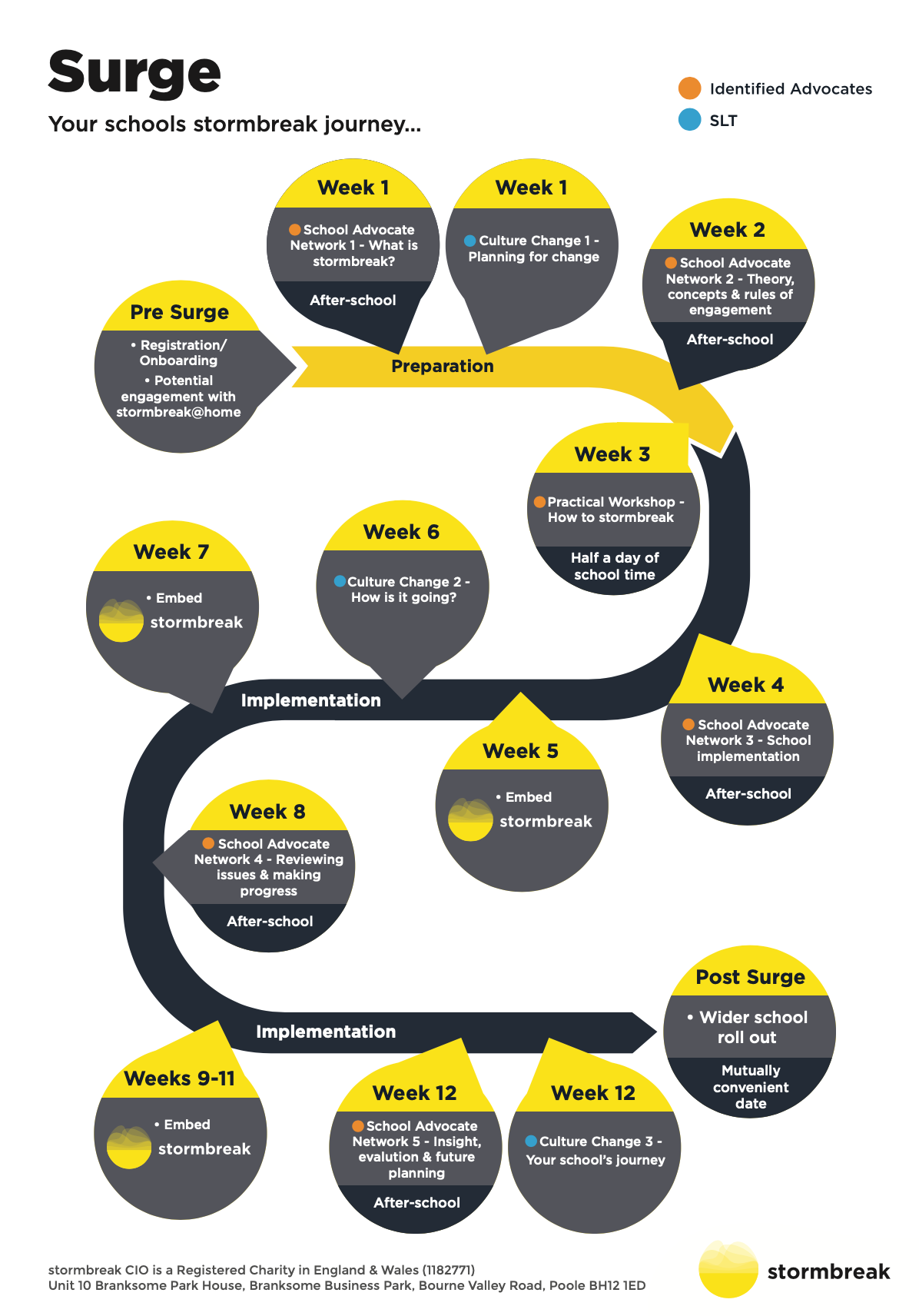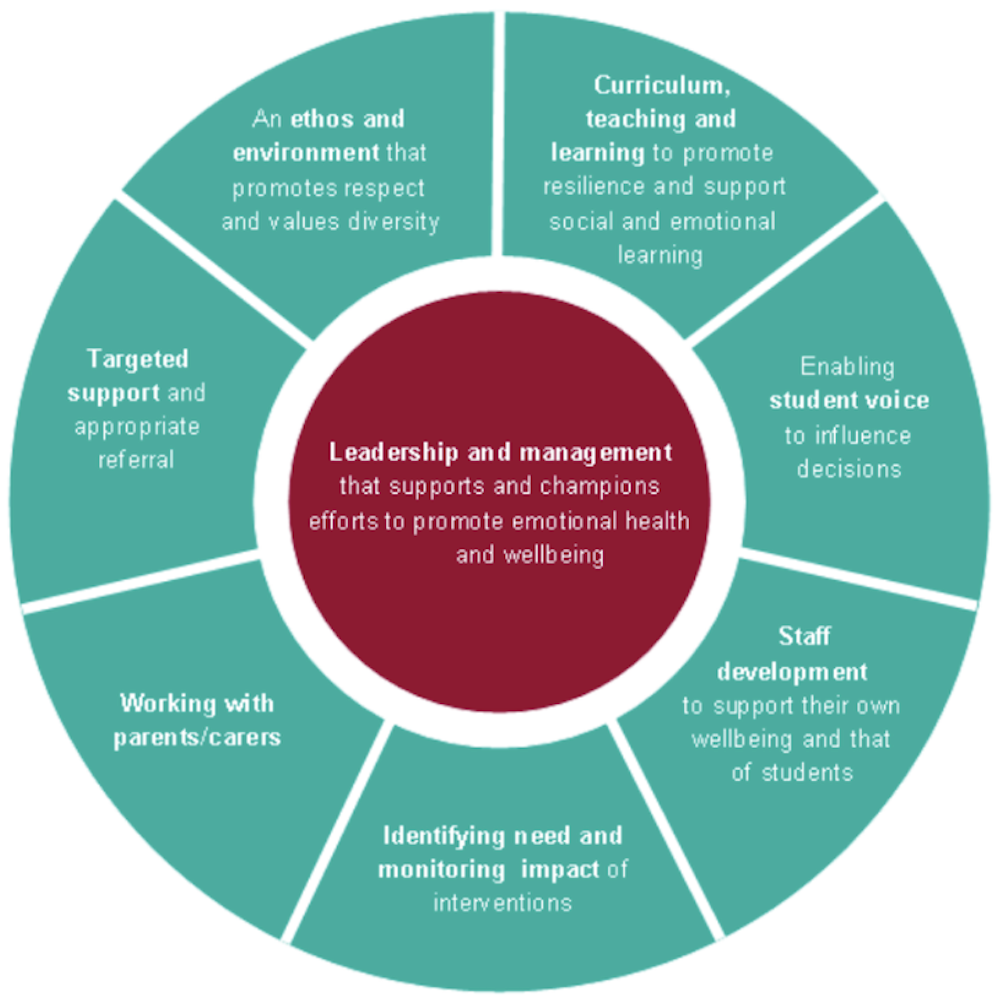School Leadership Focus: How stormbreak hits 8 principles for promoting emotional health and wellbeing in schools.

Stormbreak at school. Sign up for Surge.
Next available training April 2021 - Recruiting NOW!
In March 2015 the government published Public Health England’s guidance for headteachers on the 8 principles for promoting emotional health and wellbeing in schools. Updated at the start of February, as a response to the issues brought about by the coronavirus pandemic, it has never been more relevant. Read on to find out how stormbreak can support your school to meet the 8 principles outlined in the guidance.
The guidance outlines 8 principles to promote emotional health and wellbeing in schools, as outlined in the following diagram.
Principle 1: Leadership & Management
Key question: How is the school or college providing visible senior leadership for emotional health and wellbeing?
The guidance states that “Support from the senior leadership team is essential to ensure that efforts to promote emotional health and wellbeing are accepted and embedded...
school leaders have an important executive role in advocating for the needs of children and learners”. As part of our surge training, we include senior leaders throughout:
- 3 x Culture Change sessions - week 1, 9 and 12 we work alongside senior leaders to:
- gain an understanding of a school's specific context and its associated mental health and movement context
- to identify any gaps between where a school is now and where it would like to be in the future
- to look for opportunities for change
- Pre and post-training audits
- this allows schools to assess the impact of the training across their setting
One of the 4 key Ofsted judgements is “the quality of leadership in and management of the school”. Stormbreak allows schools to demonstrate how leadership can effectively overcome the barriers that mental health and wellbeing issues can have on children’s learning and create a positive ethos in the school.
The guidance also recommends that “In addition to leadership from senior management, feedback from practitioners highlights the importance of having a champion who will promote emotional health and wellbeing across the organisation. Such champions do not have to be senior managers, but they do need the support of the senior management team and governors in order to take work forward in a way that is embedded across the school”. Stormbreak surge training enables chosen advocates within the school (PE leads, PSHE leads, Pastoral Care Workers, TAs etc) to be able to confidently lead stormbreak and its strategy for supporting the mental health and wellbeing of young people across their school.
Principle 2: School Ethos & Environment
Key question: How does the school culture promote respect and value diversity?
Stormbreak’s mental health concepts support schools and children to understand that it’s okay to be different, to have different feelings and display these in a way that is different from peers. Through this, we help schools to promote respect and value diversity and difference.
Through our underlying rules of engagement, stormbreak is key in supporting a school to create an ethos that supports the emotional and mental health and wellbeing of pupils. Stormbreak supports schools to focus on:
- reducing the stigma about mental health by helping to mainstream conversations during movement.
- choosing language that develops relationships where the values of respect, trust, kindness, and openness are at the core.
- listening carefully with the intent to understand and validate.
- creating cultures and environments in and through movement that foster a sense of connectedness and belonging.
Principle 3: Curriculum, Teaching & Learning
Key question: What focus is given within the curriculum to social and emotional learning and promoting personal resilience, and how is learning assessed?
Stormbreak focusses on 5 mental health concepts (resilience, relationships, self-care, self-worth and hope & optimism) and aims to provide pupils with a toolkit of knowledge and skills that will support their own wellbeing, now and in the future. Stormbreak supports schools to incorporate emotional health and wellbeing into their PSHE curriculum and help them to create lasting change.
“Stormbreak has been so popular. In our school, we believe we can embed it every day, in every class, for all children. It is absolutely brilliant because staff can see the benefit, children can see the benefit”
Deputy Head Teacher
Principle 4: Student Voice
Key question: How does the school or college ensure all students have the opportunity to express their views and influence decisions?
The guidance states that “Involving students in decisions that impact on them can benefit their emotional health and wellbeing by helping them to feel part of the school and wider community and to have some control over their lives. At an individual level, benefits include helping students to gain belief in their own capabilities, including building their knowledge and skills to make healthy choices and developing their independence. Collectively, students benefit through having opportunities to influence decisions, to express their views and to develop strong social networks”. As stated previously stormbreak aims to provide pupils with a toolkit of knowledge and skills that will support their own wellbeing, now and in the future, allowing them, as the guidance states, to “have some control over their lives”. Through our work with schools over the past couple of years, we have seen pupil voice really start to shine in schools that have really embedded stormbreak into their school and curriculum. Pupils begin to ask for specific stormbreaks to solve or overcome certain issues.
“Because they are doing stormbreak so frequently they are developing mental health language and also able to use it on their own because they are doing it so much.”
Deputy Head Teacher
In addition to this at stormbreak, with the support of BBC Children in Need, we are also developing a stormbreak child champion programme, which will include direct input from children in its development.
Principle 5: Staff Development, Health & Wellbeing
Key question: How are staff supported in relation to their own health and wellbeing and to be able to support student wellbeing?
Within the guidance, it says that “It is important for staff to access training to increase their knowledge of emotional wellbeing and to equip them to be able to identify mental health difficulties in their students”. The surge training provides exactly what is stated, giving staff the knowledge and confidence to support children’s mental health and giving the children increased capacity to support their own wellbeing. Through our term-long training, we work alongside chosen advocates to develop their understanding of how to use stormbreak to support the mental health and wellbeing of pupils. The training includes 6 CPD sessions working alongside the stormbreak team and advocates from other schools and an INSET session for the rest of the school staff.
“Stormbreak has made me feel like I am making a real difference in children’s lives. We’re teaching skills that will allow them to have a natural, not amplified, reaction to negative situations”
Class Teacher & Y6 Leader

Principle 6: Identifying Need & Monitoring Impact
Key question: How does the school assess the needs of students and the impact of interventions to improve wellbeing?
The guidance states that “There are a variety of tools that education settings can use as the basis for understanding and planning a response to pupils’ emotional health and wellbeing needs. The tools range from simple feedback forms to validated measures which can focus on both wellbeing and mental health”. Learning and impact can be assessed via our stormbreak digital platform. We capture data around stormbreak delivery type, frequency, effectiveness in each school and survey data with schools, parents and children.
We also offer schools an opportunity to become a ‘research school’ when they take part in our surge training, enabling them to deliver stormbreaks to pupils themselves. Through our internal and external evaluation team (Bournemouth University) we engage schools in various methods of data collection, including surveys and established measurement tools (including WEMHS and adapted Kidscreen surveys).
- An initial a mentally healthy movement audit
- Outputs from school leader culture change sessions
- Teacher engagement feedback (surveys at touchpoints of delivery)
- Teacher and school engagement in stormbreak delivery through digital tracking, delivery feedback, and school implementation dashboards
- Teacher and child evaluation surveys (including wellbeing)
- Parent evaluation surveys (where stormbreak is shared at home) and sometimes we do case study teacher interviews
Principle 7: Working with Parents/Carers
Key question: How does the school or college work in partnership with parents and carers to promote emotional health and wellbeing?
In the guidance, it states that “The family plays a key role in influencing children and young people’s emotional health and wellbeing. There is strong evidence that well-implemented universal and targeted interventions supporting parenting and family life that offer a combination of emotional, parenting and practical life circumstances have the potential to yield social as well as economic benefits”.
The stormbreak website www.stormbreak.org.uk allows parents to create accounts in the home and use these to support their children in the home, linking into the work done in school. Setting up an account is easy for parents/carers as can be seen by this short video. The website also includes a variety of resources to support parents/carers including animations and explainer videos.
In addition to this at stormbreak, with the support of BBC Children in Need, we are also developing a stormbreak together programme designed to support parents and carers in supporting their children with mental health and wellbeing.
Principle 8: Targeted Support
Key question: How does the school ensure timely and effective identification of students who would benefit from targeted support and ensure appropriate referral to support services?
At stormbreak, we are very clear that our approach is a prevention at scale model, based on whole-school approaches. The guidance states that “Delays in identifying and meeting emotional wellbeing and mental health needs can have far-reaching effects on all aspects of children and young people’s lives, including their chances of reaching their potential and leading happy and healthy lives as adults”. Our aim is not to replace specialist services of support, such as CAMHS, and would encourage schools to refer children to the correct specialist, should it become evident that a child’s wellbeing needs a higher level of support than a school is able to offer. On our website, we offer signposting links to a range of specialist services.
Please read our insight report for more information on the benefits of stormbreak.
Follow the link if you are eager to find out more about our ‘surge’ training or if you have any further questions please do not hesitate to contact us at hello@stormbreak.org.uk.


